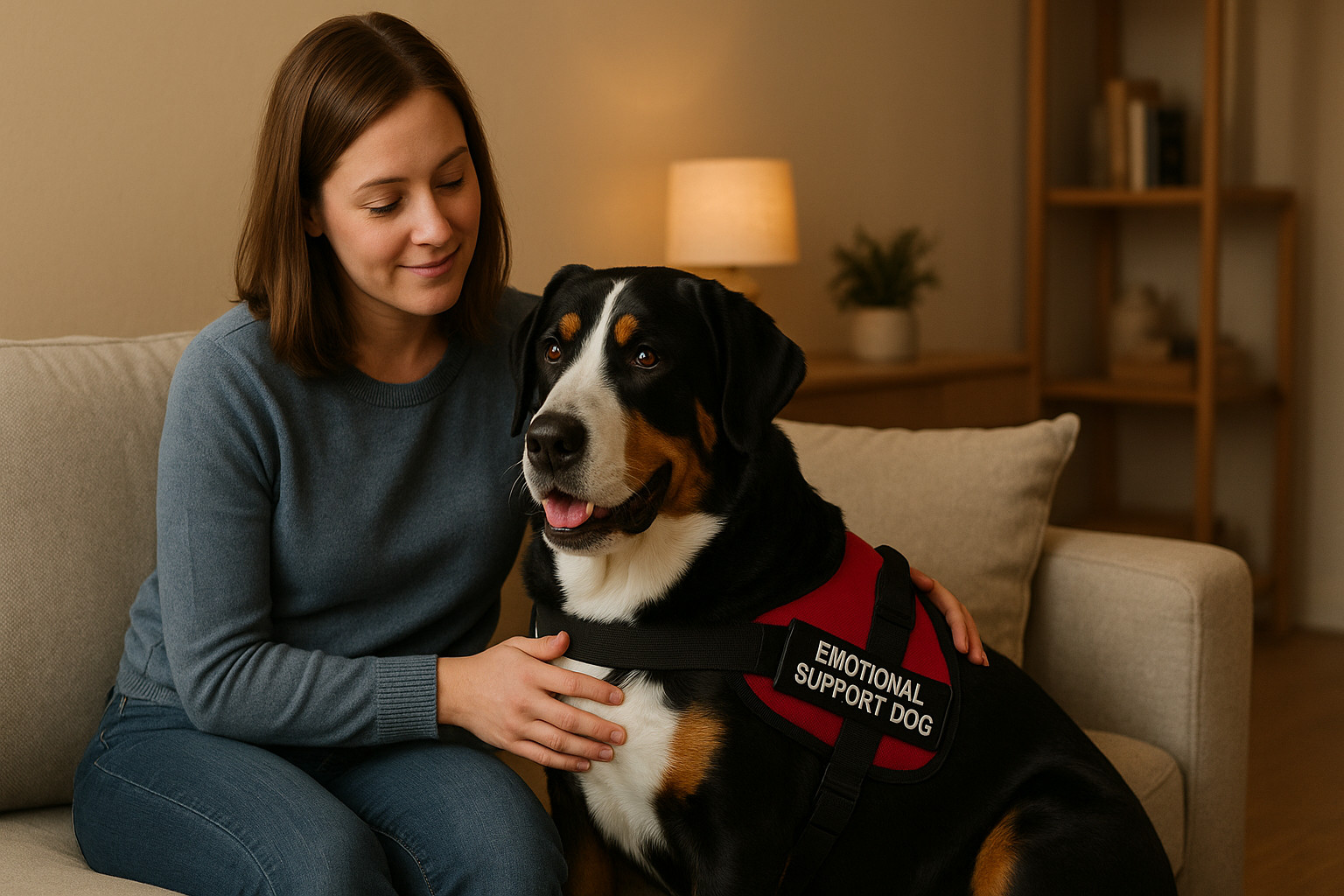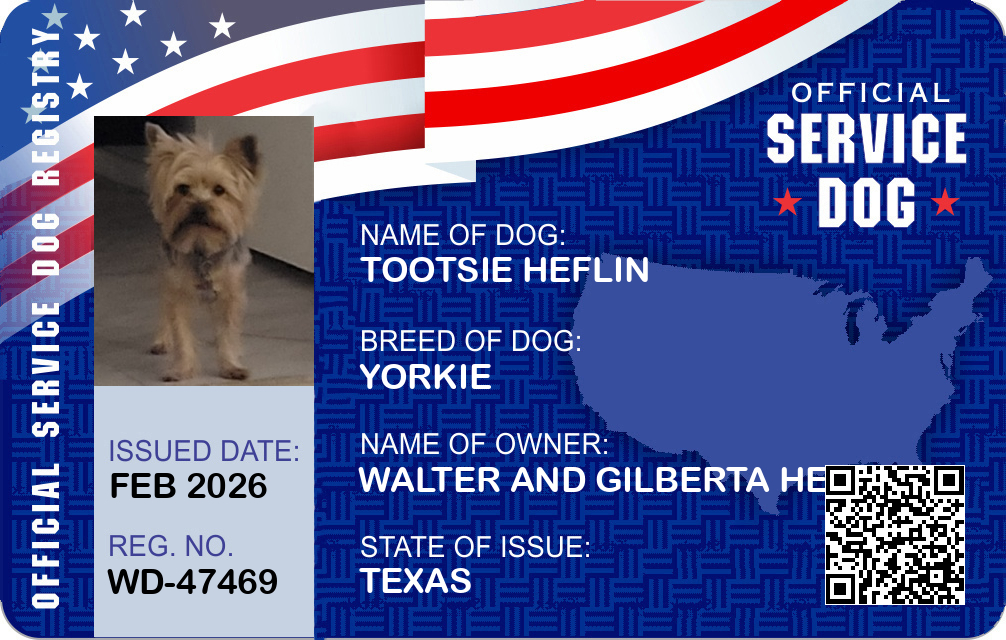Great Swiss Mountain Dog as an Emotional Support Dog
Get Your Documents

Understanding the Emotional Support Role
Emotional support animals (ESAs) provide comfort and companionship to individuals experiencing mental and emotional distress. Unlike service or therapy dogs, the primary role of an ESA is to offer consistent emotional presence and unconditional affection, helping their owners navigate through challenges such as anxiety, depression, or loneliness. The Great Swiss Mountain Dog, with its gentle disposition and loyal nature, stands out as a potential ESA for those in need of such companionship. There’s much to consider when evaluating their suitability for this role, focusing on their temperament, adaptability, and care requirements.
Great Swiss Mountain Dog Overview
The Great Swiss Mountain Dog, originating from the Swiss Alps, is known for its impressive stature, strength, and striking tricolor coat. Often mistaken for the Bernese Mountain Dog, its demeanor is what truly sets it apart. With a height ranging from 23.5 to 28.5 inches and a weight between 85 to 140 pounds, these dogs are sturdy and robust, yet exhibit a calm and patient disposition that is invaluable in an ESA. Despite their intimidating size, they have an approachable and gentle nature that endears them to many as reliable companions for emotional support.
Temperament and Emotional Connection
At the heart of the Great Swiss Mountain Dog’s appeal as an ESA is its temperament. Known for being affectionate and loyal, they form strong bonds with their human companions. This breed is naturally attuned to human emotions, displaying a profound ability to read and respond to their owner’s emotional state. Their empathetic nature means they offer steadfast companionship to those who need it, often providing a reassuring presence during times of stress or emotional turmoil. This sensitivity extends to their ability to detect subtle changes in their owner’s behavior, making them excellent candidates for individuals with mental health challenges.
Adaptability and Daily Behavior
A noteworthy attribute of the Great Swiss Mountain Dog is its adaptability to various living situations and environments. Despite their large size, they are known for their calm demeanor, which makes them surprisingly adaptable to different types of homes, provided they receive adequate exercise. Their moderate energy levels mean they are enthusiastic yet manageable for most owners, contributing to their capacity to reduce anxiety and tension. Their natural curiosity and keen interest in family activities also promote a sense of inclusivity and shared purpose, which can be particularly comforting to people feeling isolated or disconnected.
Situations Where Great Swiss Mountain Dog Provides Strong Support
The Great Swiss Mountain Dog thrives in family settings where its sense of belonging is reinforced. Their patient and gentle nature makes them well-suited for households with children, where their presence can ease familial stresses and instill calmness. Additionally, these dogs excel as companions to individuals living alone, where their loyalty and affectionate nature can significantly mitigate feelings of loneliness. They also provide invaluable support in assisted living settings, where their calming presence and eagerness for gentle physical interaction can bring joy and tranquility to residents.
Ideal Living Environments
Though well-suited to a range of environments, the Great Swiss Mountain Dog’s size makes it more suitable for homes with ample space, such as suburban or rural settings. They thrive in environments that offer opportunities for both exercise and mental stimulation, such as large backyards or access to parks. That said, with sufficient outdoor time and proper exercise routines, they can adapt to city living. Their strong attachment to human companionship means they do best where they are not left alone for long periods, particularly in environments where they can be part of family activities.
Bonds with Different Types of People
The Great Swiss Mountain Dog’s sociability makes it an ideal ESA for a variety of individuals. They have a natural affinity for children, often displaying a nurturing and protective demeanor, which can be beneficial in family settings or for children in need of emotional support. For older adults, their gentle nature and desire for companionship provide both comfort and a sense of security. Young professionals or individuals dealing with mental health issues can also find solace in their loyalty and unconditional love, which can act as a foundation of emotional stability in otherwise challenging circumstances.
Health, Care, and Wellbeing
While the Great Swiss Mountain Dog is a robust breed, it comes with certain health and care considerations that potential owners should keep in mind. Ensuring the dog’s health is fundamental to their ability to perform their emotional support role effectively.
Common Health Considerations
Owners should be vigilant about common health issues associated with the breed, including hip dysplasia, elbow dysplasia, and certain genetic conditions. Regular veterinary check-ups are vital to monitor their overall health, preventing issues that could impair their capacity to offer consistent emotional support. Additionally, maintaining an appropriate diet and regular exercise regime is crucial, as obesity can exacerbate joint issues, affecting their mobility and well-being.
Grooming, Comfort, and Maintenance Needs
The Great Swiss Mountain Dog requires regular grooming to maintain its distinctive coat, with weekly brushing to reduce shedding and prevent matting. They benefit from routine baths and nail trimming to ensure comfort and health. Attention to their grooming needs not only maintains their appearance but fosters a sense of care and routine, which can have positive emotional benefits for both the dog and its owner. Clean and well-groomed dogs are more comfortable and less likely to develop skin irritations, making them happier companions.
Preparing a Great Swiss Mountain Dog for Emotional Support Work
To prepare a Great Swiss Mountain Dog effectively for their role as an ESA, emphasis should be placed on socialization and training from an early age. This ensures they are well-adjusted and confident enough to handle various situations without undue stress or anxiety.
Socialization and Responsiveness
Exposure to different people, places, and experiences is crucial to developing their calm and composed demeanor. This socialization helps them adapt to changing circumstances and maintain a relaxed presence, making them more effective emotional supports. Basic obedience training that focuses on responsiveness to commands enhances their ability to engage positively with their human companions, bolstering the emotional connection.
Managing Stress and Emotional Cues
Understanding and managing stress is essential for a Great Swiss Mountain Dog’s efficacy as an ESA. Owners should learn to recognize signs of stress in their dog, such as changes in behavior or appetite, and address these promptly. Consistency in routine and positive reinforcement during training sessions fosters an environment where the dog feels secure and valued, optimizing their emotional and psychological health.
Strengths, Challenges, and Ideal Homes for Great Swiss Mountain Dog
While the Great Swiss Mountain Dog has many strengths as an ESA—such as their loyalty, calm demeanor, and adaptability—it’s essential to recognize and address potential challenges. Their size necessitates ample space and consistent exercise, which might not be suited to every owner. Moreover, their grooming and health care needs require time and financial commitment. Ideal homes for these dogs understand the balance between providing space, exercise, and the human interaction they thrive on.
Final Thoughts
The Great Swiss Mountain Dog embodies the ideal qualities for an ESA with its affectionate nature, adaptability, and profound capacity for emotional connection. By understanding their needs and providing a nurturing environment, they offer unmatched loyalty and emotional stability. For individuals or families seeking support in navigating emotional challenges, the Great Swiss Mountain Dog provides an enduring bond, comfort, and companionship.
Key Takeaways for the Great Swiss Mountain Dog as an Emotional Support Dog
- Best suited for: Families, individuals with ample space, those seeking a loyal and affectionate companion
- Not ideal for: Very small living spaces without access to outdoor areas, owners unable to commit to regular exercise and grooming
- Emotional traits: Loyal, empathetic, gentle, excels in familial and social bonds
- Care and health notes: Needs regular grooming, routine veterinary care, prone to certain health issues
- Environments where they provide the most comfort: Family homes, assisted living facilities, spacious rural or suburban areas
Get Your Documents
Example State Cards













